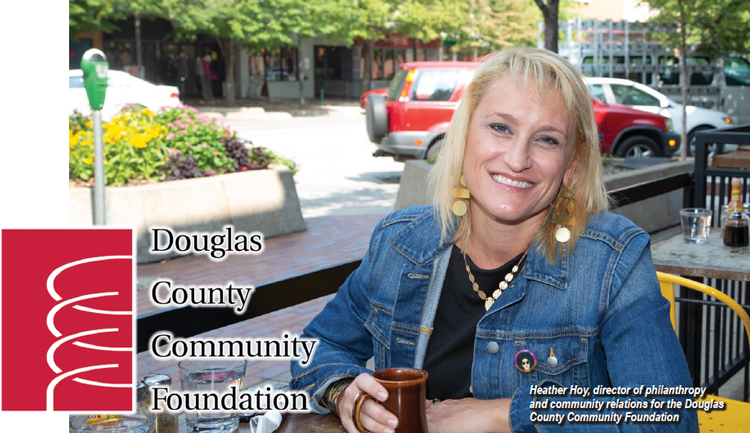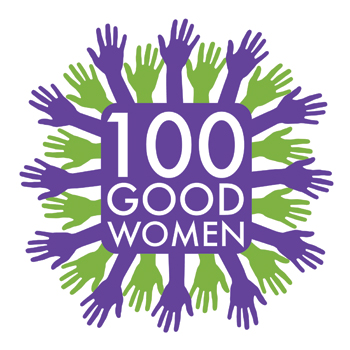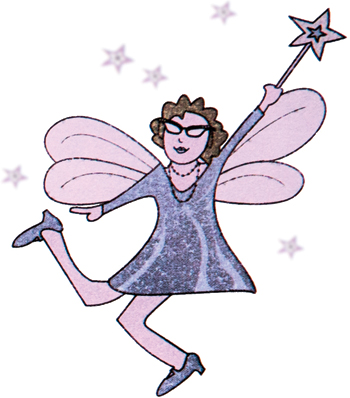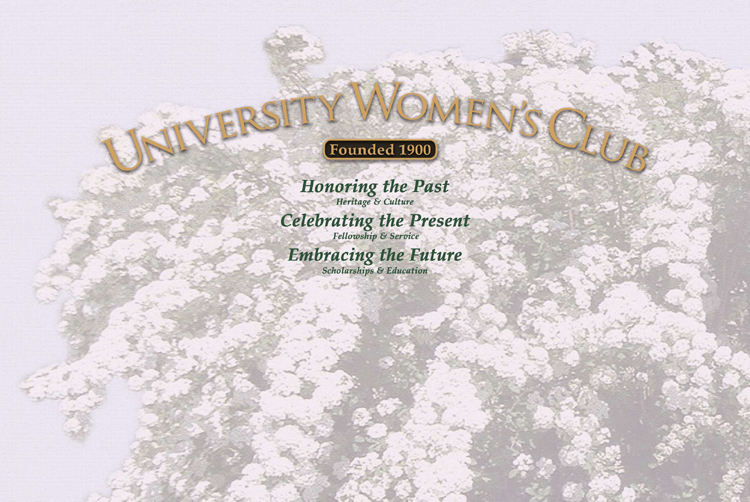Many local philanthropies focus on helping community members, especially women, get over a single hurdle that’s preventing them from moving ahead.
| 2018 Q3 | story by Tara Trenary | photos by Steven Hertzog

Tensie Oldfather
When it comes to giving back to their communities, women these days seem to be leading the charge. And it’s no wonder, with ever-increasing financial success and leadership in business, that women’s philanthropic roles are booming. It’s become clear women are tired of a lack of progress, and they demand equality. Embracing their roles as heads of households and industries, women have become powerful enough to make big changes in their communities as well as help shape public policy.
“This new wave of donor activists isn’t one-dimensional, and that’s what’s so exciting,” explains Cynthia Nimmo, president and CEO of Women’s Funding Network, in the February 2017 Forbes article “The Rising Activism in Women’s Philanthropy.” “They are millennials, they’re Gen Y, they’re Gen Z, they’re stay-at-home moms and work-outside-the-home moms, they’re single, they’re married, they work in tech, in finance, in media—you name it. It’s every woman, and she’s paying to shift the policies and systems that prevent women and girls from advancing … My strong belief is that this will continue to grow in 2018.”
She continues: “It is absolutely reaching a tipping point now. What was once a trickle is now a tidal wave. We see women donating $25 a month and women donating millions.”
This trend toward women stepping up and creating change in their communities is not only evident across the country, it’s also happening right here in our own backyard.

Heather Hoy, director of philanthropy and community relations for the Douglas County Community Foundation
Combining Local Resources
In a more traditional role within the Lawrence community, Douglas County Community Foundation (DCCF) was established in 2000 with a major gift from the late Tensie Oldfather, of Lawrence, who gave generously to a wide variety of local causes and hoped her example would attract other gifts to the foundation. DCCF convenes government agencies, businesses and nonprofit organizations, combining resources to promote positive change. It offers grants to organizations that impact nearly every person in Douglas County.
“We are not a social service agency, rather a charitable giving organization,” explains Heather Hoy, DCCF director of philanthropy and community relations. “Sometimes we are approached by community members who need help, and we are able to refer them to the appropriate service organizations that can help them in crisis.”
Some DCCF funds are endowed to provide for future generations, and grants can go to arts as well as cultural, educational, environmental, health, housing, human services and youth organizations within Douglas County and beyond.
“Eighty-five percent of the organizations with funds at DCCF have women as their leaders,” Hoy says. “That’s a lot of ladies giving back to our community in the most important ways. Tensie Oldfather … has inspired all of us to be more generous. Her philosophy that working together to make the world better for future generations is the foundation of DCCF, and I am so proud to be helping to fulfill her legacy for our community.”
The foundation’s mission is to enrich the quality of life in Douglas County communities by: 1) building philanthropic resources and relationships; 2) providing attractive options for donors to make philanthropic contributions; and 3) being a catalyst for the betterment of the lives of the citizens of Douglas County. To meet the mission, DCCF offers donors the opportunity to achieve philanthropic and financial goals by establishing charitable donor-advised funds (DAFs).
DCCF provides grant support to nonprofit organizations in the community through competitive grant programs including Community Grants (twice a year); LiveWell Community Wellness Grants; Elizabeth Schultz Environmental Fund Grants; and Momentum Grants.
“In 2017, DCCF granted nearly $4 million to support the most vulnerable in our community, improve our environment and provide educational opportunities for children,” Hoy says. “Over the last 18 years, families, individuals, companies and other organizations have contributed over $60 million, and DCCF has granted over $28 million for charitable purposes.”
The DCCF staff is supported by a board of directors and a finance committee, which have helped steward asset development and made DCCF an important resource of support in Douglas County, Hoy explains. Sometimes the most interesting ways support has been offered is simply by understanding what a difference something as simple as an industrial washer and dryer can make for an organization like the Community Shelter, or nametags for Meals on Wheels volunteers, or books for a therapy classroom. “The little touches we can make as a philanthropic organization can be overlooked, but we know how appreciated they are by people who are on the ground, making our most vulnerable citizens comfortable, successful or just giving them a sense of normalcy.”
Community members know the names of the women with donor-advised funds at DCCF not only for their generosity financially but even more so for the time and talent they lend to the organizations they support in the community.
“Douglas County is a shining example of women helping others in our community everyday,” Hoy says. “There are so many women who I have looked up to as I have worked in development that I couldn’t credit just one … so many women who just believe in something and don’t let go until they achieve success for others.”

The Good Women of Lawrence
Founded in 1995 by Sarah Jane Russell and Janet Bouley, 100 Good Women began at the grassroots level to support women who had “fallen through the cracks.” After taking a Leadership Lawrence class, Russell felt compelled to do something to help those in need who were waiting for social services to begin or could not qualify for it. The group began with 80 women and a potluck dinner (it is now 500 strong). “Many of us didn’t understand Sarah Jane’s vision, but we knew we wanted to help,” says former board member Jennie Washburn.
One Hundred Good Women is a nonprofit volunteer organization that believes service creates a strong community. It is managed by a board of about eight and responds quickly to short-term needs in the Douglas County community to help back up other local social services. Funding comes directly from members and fund-raisers, and there is no paid staff.
“The needs in the community are amazingly enormous,” Washburn explains. “Unfortunately, our organization cannot do it all.” With close relationships with other organizations throughout the county, 100 Good Women steps in and provides smaller needs those other groups can’t provide, such as gas money to get to work or an interview; money for groceries to offset the electric bill; or bedding for kids coming back home after foster care.
Services provided include household goods donated by members; other services donated by members depending on need; emergency help with food and gas in the form of gift cards, etc. The group does not provide money, housing or jobs, or pay rent or utility bills.
“We expect to change someone’s life in a small and significant way,” Washburn explains. “A $50 cash card can make a huge difference when you are feeling desperate.”
In the early days, communication was tough, Washburn explains, and getting the word out about 100 Good Women hindered the organization. But today, “communication has increased and improved, and we have honed what we offer and streamlined how requests are fulfilled.” Facebook has become the main communication by which 100 Good Women receives requests, and group members respond almost immediately to each one.
Fund-raisers include a spring clothing exchange; a fall book exchange with wine and chocolate; and a winter accessories exchange and annual meeting. The organization also adopts several families at the holidays. Parents are told to let them know what they need. “They ask for the simplest things,” Washburn says, “a blanket, shoes, pots and pans. We try to go above and beyond, (but) parents never want to ask for anything. They want only for their kiddos.” So 100 Good Women surprises its holiday families with gift cards on top of their other needs. The group also gives shelter teens and single moms gift cards, as well as helping First Step women by providing stuffed animals to its children.
“Giving back to your community is everything. Everything,” she says. “Buy art, give to a person on the street … pay off a kid’s balance for lunch at school. Just find something that interests you. … You will feel good.”

Judy Wright, founding member of The Fairy Godmother Fund
A Wish Come True
In 2003, a group of local women led by Barbara Smith Reavis, former executive director of the United Way, formed The Fairy Godmother Fund to help women in need in Douglas County. Her idea, explains Judy Wright, former director of the University of Kansas (KU) Chancellor’s Club, former assistant vice president of the KU Endowment Association and founding member of The Fairy Godmother Fund, was to “raise $100,000 before the end of 2004 by asking women to each give $100.” Although Wright herself believed that was a hard way to raise money, Reavis wanted to use a grassroots approach that many people could feel they were a part of. By the end of 2004, they had met that initial goal.
In spring 2005, the first gifts were given to women in need. Contributing partners throughout Lawrence would recommend qualifying women to the United Way, and it would distribute the fund. “It had to be an emergency, always and only for women,” Wright explains.
Fund beneficiaries include women with limited resources facing immediate critical needs that can’t be met by other local funding sources. Some of those who have been helped by the fund in the past include a woman who needed her wood-burning stove repaired so her house would not catch fire during winter (it was her only source of heat); another who needed glasses so she could keep her job; and yet another who had cancer but could not get chemotherapy until her infected teeth were removed (she had no dental insurance to cover this procedure). The fund covered these small, one-time events, which made a big impact in those women’s lives. “By helping women in need, we are helping children and families, as well,” Wright says.

According to the Douglas County Community Foundation (DCCF), which now manages the fund, financial assistance of up to $499 from The Fairy Godmother Fund can be provided to women who meet the following criteria: on a limited income; limited, short-term, critical need that can’t be handled by any other agency or fund (i.e., the fund does not address rent or utility requests); payment must be made directly to a vendor, not the client; funding must solve an immediate crisis (i.e., no partial payment unless the client has the ability to cover entire payment); applicants must be Douglas County residents.
The Fairy Godmother Fund donation checks are written on behalf of recipients to pay bills or expenses. Since the fund’s inception, it has received more than $235,000 in donations and utilized more than $125,000 to help local women and children with crucial emergency assistance. The remainder of the funds has been invested, explains Chip Blaser DCCF executive director, and continue to provide more than $10,000 per year in assistance.
Joan Schultz, then executive director of The Willow Domestic Violence Center, a referral agency to the Fairy Godmother Fund, says often, when a woman calls the center seeking access to the fund, they discover what she really needs is services provided by The Willow. Being a referring member has given the center the opportunity to help and reach women who might have missed out on its services. “Knowing it is there for women … is a huge benefit in our community. Women helping women. … Fairy Godmothers matters so much to The Willow and to the community.”

University Women’s Club
Outstanding Women of KU
In May 1900, The Ladies of the Faculty was organized to help women take advantage of the educational, cultural and social heritage of the University of Kansas. In 1915, the now-University Women’s Club (UWC) at the University of Kansas began an annual scholarship donation project among the membership to honor worthy women students. The group has met continuously since 1900 for friendship and to serve the University and Lawrence communities, and has awarded 254 scholarships since its inception.
The UWC serves community needs in three ways: 1) scholarship: UWC awards scholarships annually to assist women students in pursuit of their educational goals at KU; 2) service: UWC members contribute their time and talents to the University and within the Lawrence community; 3) social: UWC fosters friendships, from mentoring newcomers and keeping retirees involved, to forming groups with others who share like interests.
With approximately 350 active members, “The UWC offers many opportunities to learn about ways to help others in our community, either through volunteering or financial support. I see the membership growing and using technology to reach even more people,” says Eileen Weiss, UWC president, former president of the Lawrence Welcome Club and board member of both the Lawrence Community Shelter and the New Generation Society of Lawrence.
Since 1915, 254 outstanding KU women scholars have received more than $200,000 in scholarships, money raised through membership dues, donations and special fund-raising projects. Its 2015 centennial scholarships honored 10 undergraduate and graduate students, each receiving $3,000 for the coming academic year. This group is the oldest scholarship-granting organization at KU; recent gifts have been made possible by membership donations to an endowed fund started in the 1980s.
Kelly Harrington says she was honored to receive a scholarship from the University Women’s Club while working on her master’s degree in social work at KU, particularly because of the club’s history of assisting women achieve their educational goals. “The scholarship was a boost that helped me afford my education, and it was especially meaningful to be recognized by the UWC because of my personal passion for gender equity,” she explains. “Now, I work in the Office of Economic Empowerment at the State of Massachusetts, where we run economic opportunity initiatives, including programs and communications that target the gender pay gap. UWC helped me get to this position, where I can now use my own voice and resources to advocate for other women.”
Money isn’t the only way to give back to your community, Hoy explains. So many nonprofits need an extra set of hands or the hidden talent of an individual. “It doesn’t matter if you don’t have a lot of money; you can help anyway. Don’t be afraid to ask how you can help in ways that don’t equate to writing a check. Nonprofits are small. Help them out with your time and talent. Together, we can make a difference.”
